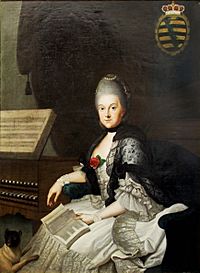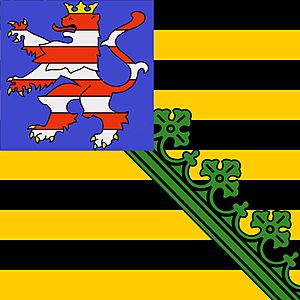Duchess Anna Amalia of Brunswick-Wolfenbüttel facts for kids
Quick facts for kids Duchess Anna Amalia |
|
|---|---|

Portrait by Johann Ernst Heinsius
|
|
| Duchess consort of Saxe-Weimar and Saxe-Eisenach | |
| Tenure | 1756–1758 |
| Regent of Saxe-Weimar and Saxe-Eisenach | |
| Regency | 1758–1775 |
| Born | 24 October 1739 Wolfenbüttel |
| Died | 10 April 1807 (aged 67) Weimar |
| Spouse | Ernest Augustus II, Duke of Saxe-Weimar-Eisenach |
| Issue | Karl August, Grand Duke of Saxe-Weimar-Eisenach Prince Frederick Ferdinand |
| House | Brunswick-Bevern Saxe-Weimar-Eisenach |
| Father | Charles I, Duke of Brunswick-Wolfenbüttel |
| Mother | Princess Philippine Charlotte of Prussia |
Anna Amalia of Brunswick-Wolfenbüttel (born October 24, 1739 – died April 10, 1807) was a German princess. She was also a talented composer. She became the Duchess of Saxe-Weimar-Eisenach when she married. Later, she ruled as a regent for her young son. She helped make her court a very important cultural center in Germany.
Contents
Early Life and Family
Anna Amalia was born in Wolfenbüttel, Germany. She was the ninth child in her family. Her father was Karl I, Duke of Brunswick-Wolfenbüttel. Her mother was Princess Philippine Charlotte of Prussia. Her grandparents were Frederick William I of Prussia and Sophia Dorothea of Hanover.
Marriage and Becoming a Regent
In 1756, Anna Amalia married Ernest Augustus II, Duke of Saxe-Weimar-Eisenach. They had two sons together. Sadly, her husband died in 1758. This meant Anna Amalia became the regent for their young son, Karl August, Grand Duke of Saxe-Weimar-Eisenach. A regent is someone who rules a country when the rightful ruler is too young.
Ruling the Duchy
Anna Amalia was a very wise ruler. She managed the duchy's affairs carefully. She made the duchy stronger and better, even during the Seven Years' War. In 1775, her son Karl August was old enough to rule on his own. Anna Amalia then stepped down from her role as regent.
A Patron of Arts and Culture
Anna Amalia loved the arts and supported many artists. She invited many famous German people to her court in Weimar. These included writers like Johann Gottfried Herder, Johann Wolfgang von Goethe, and Friedrich Schiller. She also brought in Abel Seyler's excellent theater company. This company was considered the best in Germany at that time.
She hired Christoph Martin Wieland, a poet and translator, to teach her son. Wieland was famous for translating the plays of William Shakespeare. Anna Amalia also started the Duchess Anna Amalia Library. Today, this library holds about 1,000,000 books! Goethe honored her in his work, showing how much she was respected.
Her Musical Talents
Anna Amalia was also a talented composer. She studied music with Friedrich Gottlob Fleischer and Ernst Wilhelm Wolf.
Her musical works include:
Chamber Music
- Divertimento (for clarinet, viola, violoncello, and piano) around 1780
Harpsichord Music
- Sonatas
Operas
- Das Jahrmarktsfest zu Plundersweilern (with words by Goethe)
- Erwin und Elmire (with words by Goethe) from 1776
Orchestra Music
- Oratorio (1768)
- Sacred Choruses (for four voices and orchestra)
- Symphony (for 2 oboes, 2 flutes, 2 violins, and double bass) from 1765
Vocal Music
- Songs
See also
 In Spanish: Ana Amalia de Brunswick-Wolfenbüttel para niños
In Spanish: Ana Amalia de Brunswick-Wolfenbüttel para niños
 | Selma Burke |
 | Pauline Powell Burns |
 | Frederick J. Brown |
 | Robert Blackburn |


